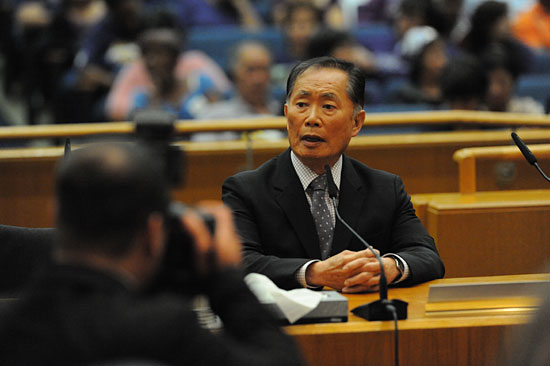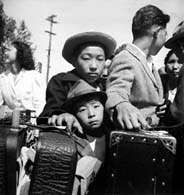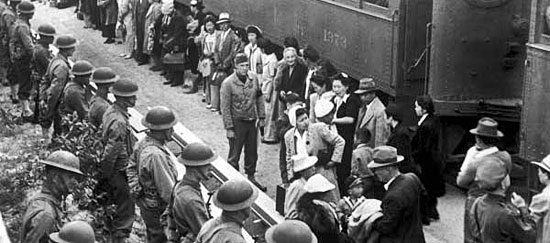Righting a wrong, 70 years later
June 7, 2012

Actor George Takei's testimony drew a standing ovation at the Board of Supervisors meeting Wednesday.
The forced uprooting of Los Angeles County’s Japanese American community took place seven decades ago—but the emotional wounds it inflicted continue to this day.
A series of speakers—including Star Trek legend George Takei—vividly recreated the trauma of those days before the Board of Supervisors Wednesday.
After they spoke, the board voted to undo a lingering vestige of the World War II era hysteria that swept families of Japanese descent from their homes and herded them into horse stables at Santa Anita before packing them off to internment camps.
Supervisors, acting on a motion by Supervisor Mark Ridley-Thomas, voted to rescind a 1942 county resolution urging the forced relocations.
“It’s never too late to do the right thing,” Ridley-Thomas said.
Doing the right thing, in this case, meant first confronting the painful details of individual experience that grew out of a cascade of federal, state and local actions.
Takei recalled a day in April, 1942, when he and his brother looked out their living room window and saw “two American soldiers with bayonets flashing on their rifles come marching up our driveway, stomped on our front porch and banged on our front door.”
“My father answered it, and we were ordered out of our house,” he continued. “And I remember seeing my mother carrying my baby sister and a huge duffel bag…and I saw tears rolling down her cheek.”
Their odyssey took them from a stable at Santa Anita that still “stank of horse manure” to “a barbed wire camp in the swamps of southeastern Arkansas,” Takei said.
Rose Ochi, a pivotal player in establishing the national historic site at Manzanar, one of 10 internment areas across the country, made a similar trip as a child—and was literally changed for life by the experience.
“My mother had given me a fine name, Takayo, which means a child with high ideals. But my Arkansas teacher decided to give me an American name, Rose. As years pass, I feel at least thankful that I didn’t get Petunia,” Ochi said with a laugh.
“But let me tell you,” she continued, “when you are not considered a real American, and you come to feel like you’re an outsider, it can be very damaging to a young child.”
Many speakers asked the board to act on behalf of those who were no longer here.
Ken Inouye of the Japanese American Citizens League remembered his Colorado-born father as a “proud American” who had been “living the American dream” before the U.S. entry into World War II. But he had the misfortune of graduating from UCLA in 1941, and found himself catapulted into a new world where he was suddenly being told “we don’t want your kind.”
“Please do this and honor his memory,” Inouye urged supervisors before their vote.
Board chairman Zev Yaroslavsky said the speakers had helped the supervisors to “walk a mile in your shoes.”
“This is more than a symbolic act on the part of the Board of Supervisors today,” Yaroslavsky said. “It is statement of humanity on our part. It’s an instruction to all public officials, all bureaucrats, all decision-makers, to stop, look and listen when the temptation to paint all peoples with one brush or violate our Constitution present themselves.”
The day held many emotional moments.
“I hope our country will never go through this again, although I’m not sure,” Supervisor Gloria Molina said tearfully.
And William T Fujioka, the county’s Chief Executive Officer, choked up as he related his own family’s history during the period. His grandfather, a prominent Little Tokyo business man, was picked up and sent to Leavenworth prison without charges. His father, a fourth year student at Berkeley, “was removed from his classes and then with the rest of his family taken to Heart Mountain.”
But, Fujioka said, his father went on to fight for his country and became a decorated veteran of the 442nd Regimental Combat Team of Japanese American soldiers. “My father taught me not only to be a proud Japanese,” Fujioka said, “but a proud American.”
In their action Wednesday, supervisors formally rescinded their predecessors’ resolution of January 27, 1942, which warned that people of Japanese descent in California “would constitute a potentially dangerous fifth column enemy” in the event of an invasion.
It urged the federal government to move these residents “from the Pacific Coast areas and care for them at inland points where they could till the soil far removed from airfields, power and water lines and other strategic defense facilities.”
“It is difficult if not impossible to distinguish between loyal and disloyal Japanese aliens,” the motion said, while an accompanying letter added:
“As thousands of our men are being killed by the Japanese it would seem only fair and logical that those Japanese who are loyal to the United States would understand the wisdom of such action and would not object, while those disloyal would object and thereby prove their disloyalty.”
The 1942 resolution “would be comical if it weren’t so tragic,” said Bill Watanabe, executive director of the Little Tokyo Service Center, who was born at Manzanar.
He said it was important to disavow the motion and what it stood for.
“This kind of thinking cannot exist in the great county of Los Angeles, which takes pride in its own diversity—so that no matter whether you wear a turban or a hoodie, or whatever group you’re from, your rights will always be respected.”
Watch the testimony from Wednesday’s Board of Supervisors meeting in this video.
Posted 6/7/12














 405 bridge work causes a stink
405 bridge work causes a stink





